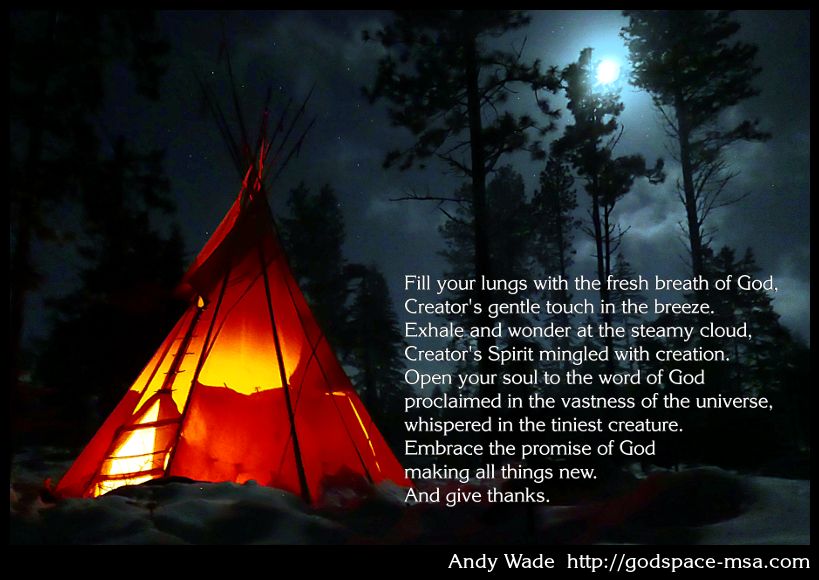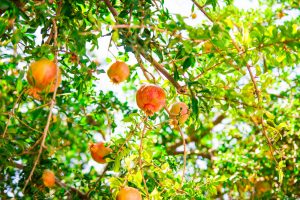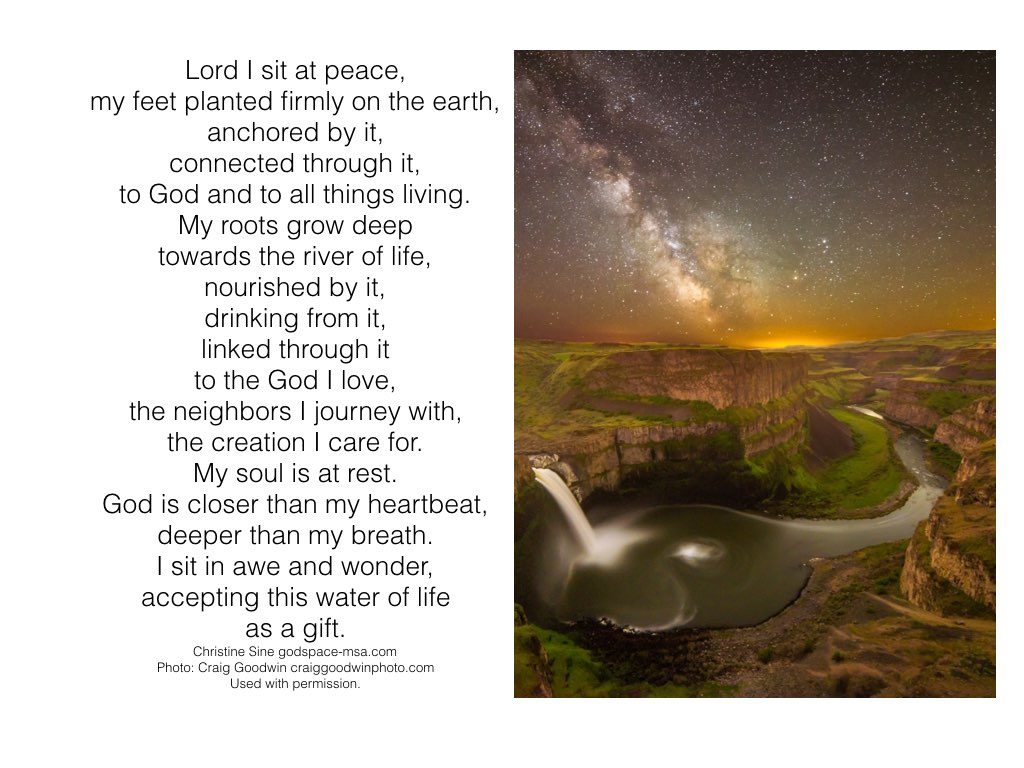Exodus 34:6-7: “The Lord passed in front of him and proclaimed:
‘The Lord! The Lord!
God who is compassionate and merciful,
very patient,
full of great loyalty and faithfulness,
showing great loyalty to a thousand generations,
forgiving every kind of sin and rebellion,
yet by no means clearing the guilty,
punishing for their parents’ sins
their children and their grandchildren,
as well as the third and the fourth generation’,” CEB.
Prayer:
Dear loving LORD,
we praise You for passing before us
in the beauty of worship,
in the words of Your Word,
in the forgiveness
and restoration that comes to us
through Your Son, Jesus Christ.
But I don’t have Your patience, Lord,
and frankly, I don’t want to pray for it
for fear You’ll send hard trials
to help me become
ever more tolerant of others!
Forgive me, Lord.
Forgive my lack of trust in You
and my annoyance with myself.
I think I want every pore in me
to exude Your love,
but that’s not really true, is it?
Love costs a lot –
a lot of mercy,
a lot of grace,
a lot of patience,
a lot of faith,
a lot of You!
Help me, LORD, to receive You more fully. Help!
Thoughts: Grace, mercy, patience, faithfulness: These aspects of love repeatedly pass before us without acknowledgement or even awareness that God is here; God is near. I wonder which of those aspects of God’s love is most lacking in my life? Do I dare think about it? If I really, really don’t want to know, could this be a sign that I’m not placing my faith and trust in God’s everlasting love? Do I trust myself to know what’s best for me, more than I trust God?
By Andy Wade –
Rejoice in the Lord always. I will say it again: Rejoice! Let your gentleness be evident to all. The Lord is near. Do not be anxious about anything, but in every situation, by prayer and petition, with thanksgiving, present your requests to God. And the peace of God,which transcends all understanding, will guard your hearts and your minds in Christ Jesus. Finally, brothers and sisters, whatever is true, whatever is noble, whatever is right, whatever is pure, whatever is lovely, whatever is admirable—if anything is excellent or praiseworthy—think about such things. Philippians 4:4-8
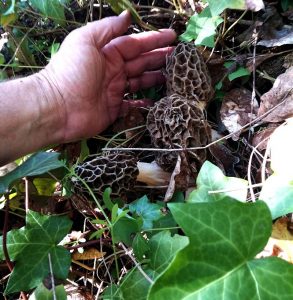 It’s morel mushroom season across the USA. I love wandering through the wilderness looking for these delicacies (which I hear go for as much as $50/pound in some places!). Hopping off my motorcycle and grabbing my knife and bag I venture off under the canopy of trees.
It’s morel mushroom season across the USA. I love wandering through the wilderness looking for these delicacies (which I hear go for as much as $50/pound in some places!). Hopping off my motorcycle and grabbing my knife and bag I venture off under the canopy of trees.
Even though my mind and eyes are set for the hunt, somehow I can’t see them at first. Eyes fixed on the forest floor, slowly scanning side to side, with great anticipation I anxiously wait to spot the first shroom. “Where are they?” I wonder, all the while knowing that I’ve surely passed by many already, even trampling on a few.
I think we get this way in life. With all the madness around us our eyes can grow dim to seeing all the goodness that is there, often right in front of us. After I spot my first mushroom, before I cut it, I like to look at it there in the ground. Perhaps partially covered in leaves or poking up under some sticks, I stare at it, really take it in. I’m training my eyes to “see”.
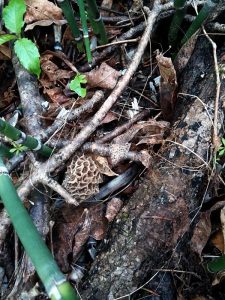 It seems every outing is like this – I’ve even parked my bike almost right on top of them! But once I see my first morel I start to notice them everywhere. It’s amazing how just seeing one and really noticing it changes my perspective and makes me much more able to see another, and another, and another.
It seems every outing is like this – I’ve even parked my bike almost right on top of them! But once I see my first morel I start to notice them everywhere. It’s amazing how just seeing one and really noticing it changes my perspective and makes me much more able to see another, and another, and another.
Could this be part of what the Apostle Paul is getting at in the passage above? There’s a lot going on in our world and it often feels overwhelming. It can be easy to get discouraged, frustrated, and negative. Effortlessly, it seems, we begin to see ugliness in life everywhere. And with constant assaults on our senses from the Internet, TV, and radio, you can almost taste the negativity, the fear, and hopelessness. When swept up in it I can feel my body tense. Today’s “Thriving Thursday” is an invitation to relax, to chill out and breathe deeply of God.
Yes, there are things that need changing. This is not an invitation to ignore those things. Rather this is a call to stop for a minute, refocus, recalibrate, and renew. “Rejoice!” the Apostle Paul exhorts not once, but twice. Yes we have anxieties, but we have a God who is bigger than our fears and concerns. A call to activism may well flow from the heart of God, but if we engage in it from our anxiety and anger we’re more likely to make matters worse.
To find that place of peace even in the vacuum of uncertainty, we have to see in a new way. Paul challenges us to do this by looking at the positive, the “praiseworthy”. While this could be seen as trite, or worse, outright denial, Paul is actually calling us to something deeper and very profound. At the core of every story, every crisis, every fear, God is present, ready to act. But we will not see it unless we have eyes to see.
-
How do you train your eyes to see the new things happening in your area?
-
How do you train you eyes to see “old things” with fresh perspective?
By Rowan Wyatt
As you walk through the shopping area in the center of Tunbridge Wells, on any given day, you run the gauntlet of being pounced on and harangued for money, often quite aggressively, by people who are being paid by charities to sign you up for direct debits for their already very rich charities. You can always tell the charities that can’t afford to pay people to hassle you for money, as the volunteers collecting are patiently waiting, greeting each clinking of coins with a grateful smile, whereas the paid collectors hassle and are aggressive, and don’t care about the charity.
When Keren and I were hit by some financial hardship recently we were determined to continue, as much as we could, to give our money to the charities and organizations we support. We had to cut funding to some, and as we sank deeper into hardship we had to cut even more. I have never felt more upset than I did then, to write to people and say “I can’t give anymore”. We have a girl, Mekdes, that we sponsor in Ethiopia through Compassion UK. We have supported her for many years and we decided that no matter what we would always ensure we could pay for her, I am pleased to say we have never once failed to provide our sponsorship money for her.
Giving is a gift that God has given us. Some may scratch their heads at that, how can us giving our money away be a gift from God. But it is and it’s not just a simple act of contrition to make you feel better about yourself, it is a real way of blessing people and being blessed in the process. I can’t get to Ethiopia to see Mekdes but I know that thanks to our small act of giving each month, she receives clothing, food and education. It is a way of touching someone’s soul, connecting with love, not because you have to, or it’s the right thing to do but because LOVE has moved you to do it. It is a gift to us to know that thanks to our giving Mekdes has a better chance in life, and with the thousands of others who also sponsor children through Compassion, others get that blessing too.
Giving is not just an offering to help those in need it is also an offering to God. It is pleasing to God, he wants us to give and finds joy and love in that act, He delights in us when we give gladly. Look at Mark 12: 41-44 to see Jesus’ viewpoint. The large sums being offered didn’t interest him, he was only concerned with the heart of the giver, the poor widow who had naught to give but gave anyway, with a willing and joyful heart. Because she loved God, and through that act God blessed her, what a precious gift.
The title of this article may seem a bit flippant, but I really mean it. Give with your all, your whole body and soul. If you don’t have finance to give, then give in kind with your time. Physically serve, use your hands and feet, helping people or working for free doing some part-time admin. All is a gift from your heart which blesses others and yourself.
Who do you give to? Follow your heart, let God speak to you. Ask him where you can direct your help and allow him to guide you in what charities/organizations you should donate your money or time to. There are charities that I wouldn’t give a penny to and others I wish I could give more to. It isn’t possible to help all of them, no matter how hard you try, so follow your heart. Let the Holy Spirit guide you. A few days ago I was out and I saw a homeless girl, huddled with her dog in a doorway. I can’t put her up or give her a home. I can’t give her a job or an income but what I could do was remember that poor widow and give what I had to give. I didn’t look to see what I gave, I just gave all the cash I had, patted the dog and walked on. God used me to bless that girl and blessed me at the same time.
You often hear nowadays of compassion fatigue. I don’t think people are tired of being compassionate or giving money to charity, I do feel they are tired of the aggressive tactics being used in the streets, or seeing the managers of these charities driving around in very expensive company cars and living in big houses on large salaries, all paid for by the donors. Look at who you give to and pray about it. Let God guide you and when he makes it clear, give joyfully and as abundantly as you can, just as God has.
For starters please take your time to look at these few wonderful organizations. Thank you.
Compassion UK Compassion UK
Compassion USA Compassion International
By Lisa McMinn
Betty Crocker was invented in the 1920s to sell cake and bread mixes, but she became iconic as an advice-giving guru who inspired women to see housekeeping and cooking as honorable and satisfying callings. Susan Marks, author of Finding Betty Crocker: The Secret Life of America’s First Lady of Food, unpacks this history and briefly discusses Betty Crocker’s role in shifting the American diet from whole foods to factory-processed convenience foods.
But it wasn’t just Betty Crocker mixes that changed cooking. Frozen TV dinners arrived in grocery stores in the early 1950s. Swanson executive Gerry Thomas saw his first three-compartment aluminum tray on a Pan Am Airways flight and is credited with bringing these prepackaged frozen meals into the American home. The first came out in 1952, but the boom came the next year following a turkey surplus after Thanksgiving. What to do with leftover turkey? Make leftovers!
The first Swanson TV dinners included turkey with cornbread dressing, potatoes, and frozen peas; more than 10 million dinners were sold in the United States, the population of which was about 150 million at the time. The rest, as they say, is history. In spite of Betty Crocker’s efforts to the contrary, prepackaged processed foods offered convenience that melded with other social forces, so that by the 1950s the American diet had pretty well shifted, along with a dominant view that drudgery best defined cooking in the same way that it defined washing diapers and scrubbing toilets. Phrases such as “slaving over the stove” and the “drudgery of cooking” abounded in advertisements, along with “You Deserve a Break Today” and other slogans that reinforced the slaving, repetitive, and boring dimensions of cooking.
Unfortunately, the women’s movement also encouraged the adoption of processed food. Women contributed significantly to the labor pool needed for the Allies’ victory in WWII. They worked in munitions and food factories, operated machines, pumped gas, and delivered mail. With the return of soldiers, most of the women went back to homemaking—some quite happily and some with frustration and resentment. The emancipation of women in 1920 gave women the right to vote, and seeking equal educational and economic opportunities became the focus of the movement, although it went into a period of dormancy during WWI and WWII. The women’s movement in the 1960s and 1970s is better known for fighting to broaden women’s reproductive and sexual choices, but it also continued to fight for legislation that would prohibit discrimination in hiring and pay practices in the workplace. Out of a desire for meaningful careers and the sheer economic necessity of bringing money into the family, increasing numbers of women went to work.
According to a 2013 US Bureau of Labor Statistics report, 68 percent of married mothers and 75 percent of unmarried mothers leave their homes for paid work. Although women now earn a significant portion of the household income, what hasn’t much changed is the breakdown of household chores. Women still do most of the cooking, so working mothers put in a double shift, as it were. They work eight hours a day at a job and then come home to laundry, cleaning, overseeing homework, teachers’ meetings, doctor’s appointments, and cooking. Making nutritious meals for the family is often just another task added to a very full plate. As a result, convenience foods start looking, well, convenient, and food pretty much loses any symbolic association with the sacred, such as reminding us of God’s grace-filled sustaining presence in the world. Cooking becomes a matter of getting sustenance into bodies to keep family members going and perhaps also the pleasure in coming home to food that only needs warming up.
. . .
Within every meal lies the hope of life sustained and the potential for creativity.
Any morning I enter the kitchen and add oats from the pantry to water on the stove I reflect something of God’s sustaining nature. Toss in a spoonful of flax seed, a sprinkle of cinnamon, and a chopped apple or a handful of berries (fresh in the summer, frozen in the winter), and I have become a craftsman. Add affection for God, God’s creation, and Mark—who will eat with me—and according to Francis of Assisi, I am an artist. Cooking is good work.
Christians believe we carry God’s image within us, which is historically understood in functional and relational ways. We function as thinking, feeling, acting members of creation—standing in for God, as it were—to be the stewards who care for creation. We also reflect something of God’s image as we relate to each other, work, play, and even cook. Reflecting God’s image in the kitchen requires us to stop thinking about food only as body-fuel and see it as one of God’s primary ways to express divine provision. And we can’t make the trade without a reverence for creation.
Today’s post is excerpted from Lisa McMinn’s book To the Table: A Spirituality of Food, Farming, and Community. pp. 38-39; 44-45 Brazos Press, a division of Baker Publishing Group, (Used with permission)
The last few months have been tough. Lots of frustrations, unknown outcomes, and plenty of questions. I’ll be the first to admit I don’t do patience as well as I would like. And not being able to perceive the road ahead is a very uncomfortable experience for me. I’ve been here many, many times before. Maybe it gets to be easier as I grow. Trusting God has often been an academic exercise for me. I know in my mind that I want to trust God. I know even more that God has proven to be worthy of my trust…all our trust. Execution of that trust on an emotional level isn’t quite so simple. For me at least. How about you? And so now I find myself with this deep desire to write about a saint that I aspire to live like. A saint that, for me, embodies all that it means to trust God and let go.
So many of us have deeply held dreams for all manner of things. Who we may marry, the children we may have, the place we want to live, book we want to write, ministry we want to be involved in, degree we want to get, job, car, house, health…the list is endless really. We cling to them like a bulldog at times. “No one and nothing will ever take away my dreams”, we say. The catchy quotes are plastered all over the internet, with their stereotypical pictures that inspire and motivate us to “never give up”.
There are times to work hard to see the dreams we hold come to fruition. And there are times to relinquish a dream. Because God has a different dream in mind for us, and he is asking for us to follow him. And it’s a God dream that we already know by obedient experience will be a far better fit, that will usually stretch us, grow us, grow The Kingdom. It is at that point I found myself once again just a few short weeks ago. A moving away from a place, without any clear idea of where too from here, aside from the call to trust God. To be obedient, and wait on the next step.
St Brendan took a journey, notably with a small group of monks as companions, and after seeking God and wise council. The sea journey was full of dangers, and the protection of God was evident. There is this element of abandoning all that is known, and letting God do what was needed. Or utter surrender and trust.
“Shall I abandon, O King of mysteries, the soft comforts of home?
Shall I turn my back on my native land and my face towards the sea?
Shall I place myself wholly at the mercy of God..?
Shall I leave the prints of my knees on the sandy beach?
A record of my final prayer in my native land.
Shall I take my tiny coracle across the wide sparkling ocean?
O King of the glorious heaven, shall I go of my own choice upon the sea?
O Christ, help me with the wild waves!” Prayer of Brendan
What trust journeys do we find ourselves in right now? What dream(s) might we be relinquishing? What unknown to us, but known to God place might we be heading? Do we believe that Christ will help us? And if the answer is yes, then are you ready to take to the waves? Or maybe right now the cry of your heart is the same questions in the prayer above…shall I? Shall I? Shall I? Help! And do you know what? I think that’s ok. Because in it all you are in this real conversation with the King of Heaven, asking for help, with the people God has placed around you saying “Listen, trust God, be obedient, God is with you, and fully worth trusting.”
Last week I asked the question How faithful have I been to the disciplines to which I committed myself, not just in my spiritual life but in all of life? I then commented: I realize that before I can take this question seriously, I need to be more intentional about the practices that will shape my life in this coming season.
This week has been a good time for me to grapple with this as I have struggled to remember my new resolutions and be faithful to the disciplines I believe I need in my life at the moment. One of my important daily disciplines is my morning meditation times, which often give rise to these meditations. I start with a centering prayer, a time of quiet reflection and a pause in which to listen to God.
The prayer above has been my centering prayer this week. I sit quietly at my desk with my feet firmly planted on the ground and my eyes closed. In my mind I imagine those roots that grow deep towards God’s life giving river. I drink from it and am nourished by it. I watch the filaments that spread out connecting me to all God has created, like the mycelial network that connects plants and through which they communicate with each other. So amazing yet so fragile and easily disrupted. I imagine the nutrients that flow from me to others through this conduit, and I sit in awe of the incredible circle of creation of which I am a part.
What is your response?
Read slowly through the prayer above several times. Sit with your eyes closed between each reading and allow your imagination to be stirred. What imagery comes to mind for you? How does it encourage a deepening of your relationship to God, to God’s people and to God’s creation.
Now watch the video below, showing one of Denny Dyke’s beautiful walkable art pieces . Imagine yourself walking this labyrinth in the sand – such a beautiful way to connect to God and to the people we journey with. Yet this too is very ephemeral. It is designed to be appreciated and learned from now, for this moment. Then it is washed away with the next high tide.
I am reminded that all connections – to God, to others and to God’s creation – are fragile, so often designed to give us nourishment for a few short moments only. They move us further on our journey towards God and our neighbours and then are washed away. Each moment, each day we must reforge the disciplines we need for further nourishment and progress.
What is your response?
What images come to your mind as you watch this video? What response is God asking of you?
This year, approaching the Day of Pentecost, my teenage daughter and I have been reading the book of Acts. For myself I am seeing it through new eyes as my daughter reads it for the first time. After making a commitment to Christ at this year’s Easter Camp, she has been hungry for God’s word. We have read the book daily until we recently finished it, and during this precious time I felt growing excitement at her desire to learn and understand, and deep thankfulness to God for hearing the prayer of my heart prior to Easter Camp, that she would have a touch of his spirit. Indeed he surpassed what I asked for, and ‘poured’ out his spirit out upon her.
But it is a pouring out we celebrate, this Day of Pentecost. The same God who lit the disciples and new believers alight with the fire of his spirit still ignites his fire in our hearts and changes lives today. I rediscovered the poem below written a couple of years back when looking for one for Pentecost. The picture by Michael Durana (courtesy of Unsplash), perfectly matches a poem which attempts to capture the power of God, which through the gift of his Holy Spirit resides in and works through us. It is a mystery, it is beyond comprehension, the wonderful truth of God in us. As we become more aware of who God is, we grow in awe that he would make his home in us.
This Pentecost I pray that you have new awareness of his indwelling presence. God’s purpose for his spirit to indwell his people, is twofold. It is for us, for just as Jesus told his disciples it was best that he must go so that the comforter might come (John 16:7), the Holy Spirit assures us we are never alone, and will always know the comfort of his loving presence. But it is also for others – it is his power working through us to love and heal the world, “as you sent me into the world, I send them into the world and I consecrate myself to meet their need for growth in truth and holiness. I am not praying for these alone but also for the future believers who will come to me because of the testimony of these. My prayer for all of them is that they will be of one heart and mind, just as you and I are. Father – that just as you are in me and I am in you, so they will be in us, and the world will believe you sent me.” (John 17:18-21)
God of the storm
is living in me…
The infinite power,
all consuming, overwhelming.
A furnace of energy where the
thunder is stored,
and where the lightening is born,
resides in me?
Creator
Who makes moons that draw oceans,
stars to navigate by.
Whose vastness who can comprehend,
whose footstool is the sky,
is contained by me?
Father
Who gave His only Son.
Love that can only be measured by His suffering.
Hanging on the cross,
the cross ‘between the trees’,
dying for me?
So that He might be resurrected, so that I might be redeemed
that He would dwell in me?
Oh Great God
Who encloses and indwells me,
with the heartbeat of the blessed Trinity.
Whose river of living water
arises from eternity.
Never let me forget the truth of your presence.
For he who seeks you only without,
fails to know the rivers of delight
which flow from our innermost selves.
Oh Great God
Consume me, fill and transform me.
Not only with head knowledge,
but with a heart forever bonded
in relationship, in union with
You – Father, Holy Spirit,
Son of God.
Ana Lisa de Jong
‘In the last days,’ God says,
‘I will pour out my Spirit upon all people.
Your sons and daughters will prophesy.
Your young men will see visions,
and your old men will dream dreams.
In those days I will pour out my Spirit
even on my servants–men and women alike–
and they will prophesy. (Acts 2:17-18; Joel 2:28-29)
As an Amazon Associate, I receive a small amount for purchases made through appropriate links.
Thank you for supporting Godspace in this way.
When referencing or quoting Godspace Light, please be sure to include the Author (Christine Sine unless otherwise noted), the Title of the article or resource, the Source link where appropriate, and ©Godspacelight.com. Thank you!


